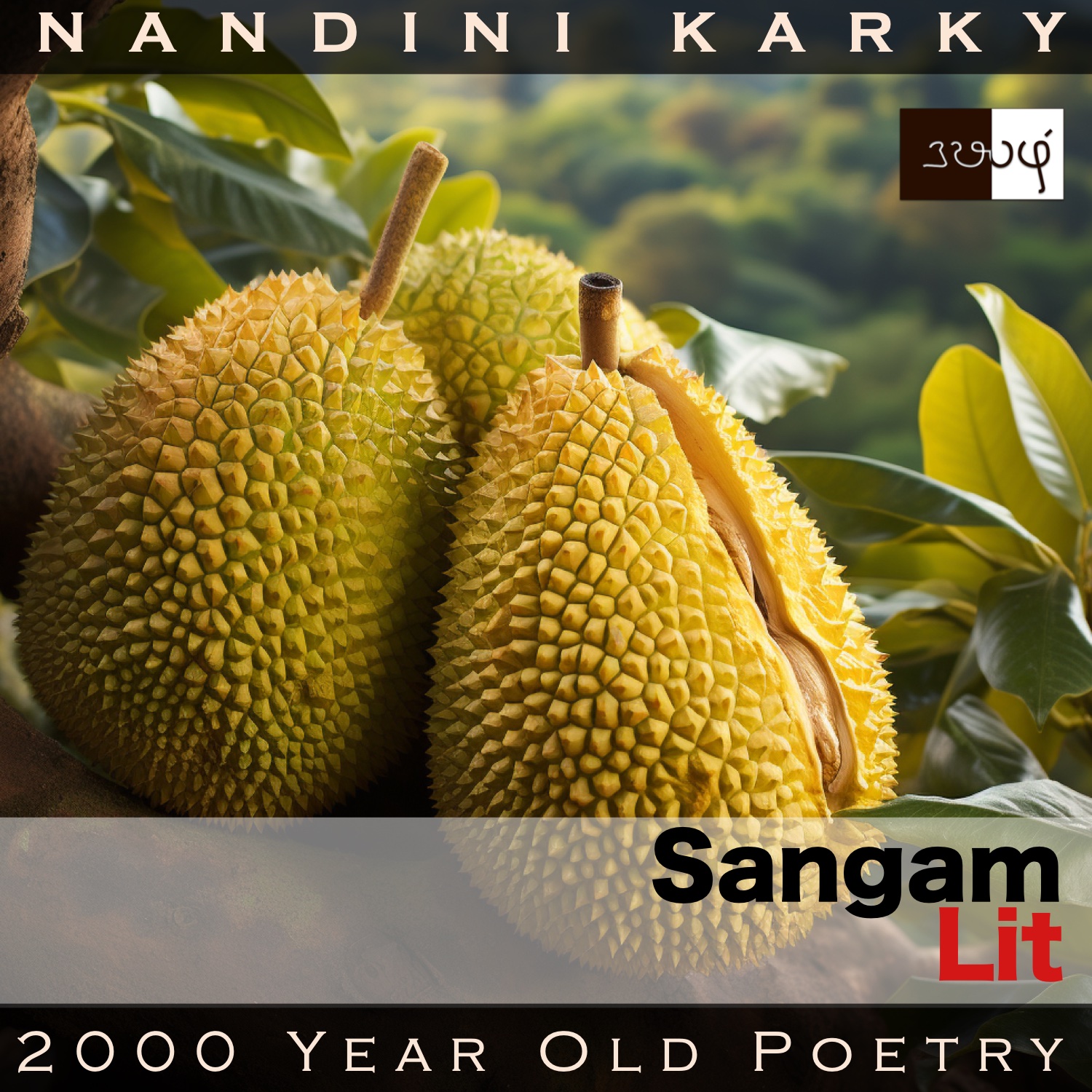Podcast: Play in new window | Download
Subscribe: Apple Podcasts | Spotify | Amazon Music | Android | iHeartRadio | TuneIn | RSS | More
In this episode, we perceive a poet’s angst at losing a friend, as portrayed in Sangam Literary work, Puranaanooru 236, penned about the Velir King Vel Paari by the prolific Sangam poet Kabilar. Set in the category of ‘Pothuviyal Thinai’ or ‘Common Themes’, the verse illustrates the deep friendship between this poet and his patron.

கலை உணக் கிழிந்த, முழவு மருள், பெரும் பழம்
சிலை கெழு குறவர்க்கு அல்கு மிசைவு ஆகும்
மலை கெழு நாட! மா வண் பாரி!
கலந்த கேண்மைக்கு ஒவ்வாய், நீ; எற்
புலந்தனை ஆகுவை புரந்த ஆண்டே
பெருந் தகு சிறப்பின் நட்பிற்கு ஒல்லாது,
ஒருங்கு வரல் விடாது, ‘ஒழிக’ எனக் கூறி,
இனையைஆதலின் நினக்கு மற்று யான்
மேயினேன் அன்மையானே; ஆயினும்,
இம்மை போலக் காட்டி, உம்மை
இடை இல் காட்சி நின்னோடு
உடன் உறைவு ஆக்குக, உயர்ந்த பாலே!
In the previous Puranaanooru verses, we saw how King Paari was killed by the Chera, Chozha and Pandya kings, and later, how the poet approached many suitors so as to offer Paari’s daughters in marriage. In this verse, he arrives at the end of this quest and renders these emotional words to the dead king. The poet’s words can be translated as follows:
“Tearing as the male monkey fed on it, looking like a drum, hangs the huge fruit that becomes the sustenance for many days for bow-wielding hill-dwellers in your mountain country, O lord, O Paari with immense generosity! You seemed not to heed our great friendship. You must have disliked me somehow. For forgetting about our great and excellent friendship in the days you supported me, you did not allow me to come with you. Instead, you told me, ‘stay’. As you said so, I could not be close to you. While that may be so, as it was in this birth, in the next birth too, without any break, make it my fate to be close with you!”
Let’s explore the details mentioned here. To describe the king’s mountain country, the poet points to a huge jackfruit that’s hanging torn because a monkey ate from it. Even after the monkey has had its fill, this jackfruit would serve as a meal for the hill dwellers for days together, the poet mentions, implying such is the fertility of King Paari’s mountain country. Now he turns to the king and declares that the king had not been true to their great friendship and he decides the king must have hated him for some reason. When we gently question the poet on why he thinks so, the poet says this is because when Paari left this world behind, he did not allow the poet to come with him but instead bid him to remain in the world, and because of this, the poet feels that he could not be close to the king. Leaving the past aside, the poet now concludes by seeking a wish from the departed king, and that is to make it the poet’s destiny to have the same bond with the king in the next life, as it was in this life!
What a deep bond that must be, to want to part away when another leaves this earth and to wish to be close in the life afterwards too! To us in this century, the kind of friendship between two men as depicted in this verse and a few others, where poets have given up their life along with their patrons, may seem impossible to believe. To explore this idea, I want to bring up a book I’ve started reading in recent times called ‘Platonic’ by a psychologist Mariso Franco, and here, I read that we have this reaction because we have ended up relegating friendships to be a grade below romantic relationships and family. The author brings up an example of the deep friendship between Abraham Lincoln and Joshua Speed, and how the expressions they used between each other and the kind of intimacy they shared would be mistaken for something different in this era. However, they lived in a time when platonic friendships were regarded as high and pure, like an elevated coming together of minds and soul, the author implies. It’s the same sentiment that I infer from this Puranaanooru verse, preceding that modern American anecdote by more than two thousand years. While thinking of giving up one’s life for another, be it in romantic or platonic relationships, is extreme indeed, such verses should nudge us to truly value and celebrate those people whom we often take for granted – the friends we are blessed to have in this life!




Share your thoughts...